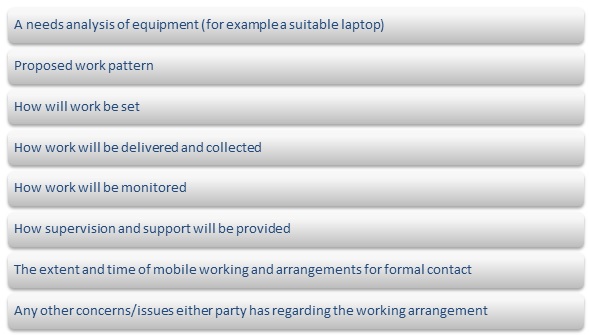- Home
- /
- People Management
- /
- Flexible Working
- /
- Flexible Working – Mobile...
Mobile and Satellite Working
See the main flexible working page for a Flexible Working Request Form and the application process.

1. Definition and Scope
Mobile working describes an arrangement where an employee is involved in a mobile occupation entailing site or client visits.
Satellite working is where the employee either works from a location other than a Council site or from a different Council sire to the employee’s normal base.
Both of these arrangements can be on a permanent or ad hoc basis.
Normally, mobile/satellite working would be done with the use of a Council lap top or other hand held device, unless the employee was working from another Council location, in which case a Council PC should be available.
The arrangements for security/confidentiality of data, information and documentation, including adherence to the ICT Acceptable Use policy and the Data Protection policy (Accessed via Internal Network only) and related procedures, should be highlighted to the employee prior to the commencement of either ad hoc or temporary mobile or satellite working.
A risk assessment should be carried out by the employee’s manager in relation to security and confidentiality of data, information and documentation, with the employee informed that they must not in any circumstances transfer Council data or information to another PC, lap top or to the Internet. Also, they should be informed that they must not upload software or other programs to a personal computer or lap top without the prior authorisation of ICT. In addition, they should be informed to have regard at all times to the type of work they are undertaking and where in their home or other location they are working, to ensure the security and confidentiality of Council information and data and should also have a facility to lock away any confidential manual information. It should also be stated that security and confidentiality must be observed when undertaking any travelling to and from workplaces or elsewhere, to ensure that Council data, information and manual files are kept secure at all times. The organisational and technical measures for different users are set out in the .
As well as the above, the employee should be informed that where access is required to Council servers or attachments in the e-mail system, a Council encrypted laptop.
2. Points to Consider
Employees often need to have access to information which is confidential, personal or commercially sensitive in order to do their jobs. Employees and managers must be aware that whatever their work location and whatever their working arrangements may be the need for security of that data is the same. All employees must comply with the ICT Acceptable Use Guidelines at all times. The rules on data protection and the provisions of the Data Protection Act apply just as if they were working in the normal office environment.
Please also see the general points to consider for flexible working.
3. Working Arrangements
The line manager and the employee should agree exactly how the arrangement is going to operate. Particular areas to be covered should include:

4. Work Location
Employees who are mobile or satellite working with the knowledge and consent of their managers are covered by the Council’s insurance arrangements for employers’ liability and personal accident as if they were in their normal place of work. It is therefore vital that a health and safety risk assessment is carried out for work locations. As the potential workplaces for mobile or satellite workers are not limited to standard office environments it may not be possible to carry out risk assessments in advance. All mobile or satellite works must therefore be trained to carry out a basic risk assessment of their work location.
5. Lone Working
As part of the risk assessment mobile or satellite workers must take into account potential hazards due to lone working. The Council’s Lone Working Policy gives details of steps that can be taken to manager any risks associated with lone working. Particular consideration should be given to:
Clear reporting procedures – it is essential that employees who are frequently in lone working situations operate an efficient diary/location indicator procedure.
- This should include:
- Location
- Telephone contact number
- Description of work
- Name of other person(s) involved
- Estimated time of return
The procedure should also include action to be taken if any employee fails to return at the indicated time.
- Personal alarms may be carried to dissuade potential attackers.
- Managers/supervisors of lone workers should be available to support and to maintain contact with lone workers.
- Information, instruction and training to facilitate the safe execution of tasks should be provided, including information on the hazards likely to be encountered, instruction about the systems and procedures to be applied and training in any skills needed to perform the job safely (this may include training in interpersonal skills such as dealing with confrontation/handling violent situations).
Relevant Documents and Links
- Flexible Working Request Form
- ICT Acceptable Use Policy
- Lone Working Policy
- Flexible Working – Points to Consider
- Data Protection Act
- Corporate Data Protection (Accessed via Internal Network only)
To return to the main Flexible Working page please click here.
Add a ‘Like’ and/or a ‘Rating’ below to indicate how useful you found this page
You must be logged in to post a comment.